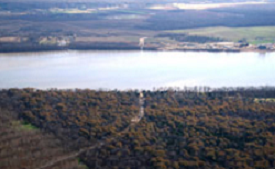Proposed Sabal Gas Pipeline Runs through Aquifer, Wetlands, Sinkhole Territory
 (APN) ATLANTA — The proposed Sabal Trail–a fracked gas pipeline through Alabama, Georgia, and Florida–would run through hundred of miles of sinkhole-prone land, will cross over one thousand wetlands, and will disturb an aquifer.
(APN) ATLANTA — The proposed Sabal Trail–a fracked gas pipeline through Alabama, Georgia, and Florida–would run through hundred of miles of sinkhole-prone land, will cross over one thousand wetlands, and will disturb an aquifer.
Some environmental advocates refer to the project as the “Sinkhole Trail Pipeline.”.
The project will include approximately 474 miles of a three foot wide, interstate natural gas pipeline; and will run through Alabama for 55 miles, southwest Georgia for 196 miles, and central Florida for 214 miles.
The 3.2 billion dollar pipeline would carry up to one billion cubic feet of natural gas a day. It will cut through conservation areas, wetlands, sensitive geologic areas, and under rivers.
The Sabal pipeline is a joint venture between NextEra, the parent company of Florida Power and Light (FPL); Duke; and Spectra Energy.
It will supply fracked natural gas to Florida for export to other countries.
Georgia gets none of the benefits, but instead gets destroyed land and water. Meanwhile, Georgia landowners get their land taken away by eminent domain.
In Georgia, it will run through nine counties including Stewart, Webster, Lee, Dougherty, Mitchell, Colquitt, Lowndes, and Brooks Counties.
“‘This is the last gasp of the dying fossil fuel industry….now that there are more solar power jobs than in all of oil and gas extraction,” John Quarterman, President of the Withlacoochee, Willacoochee, Alapaha, Little and Upper Suwannee River (WWALS) Watershed Coalition in south Georgia and north Florida, told Atlanta Progressive News.
“Solar is the least expensive of all power sources, does not require three years to permit it, doesn’t require eminent domain, and [you] can install a big solar plant in a few months,” Quarterman said.
Opponents’ foremost concern is the contamination of the drinking water in Florida Aquifer.
“The impacts are not limited to Georgia. This pipeline will converse over one thousand wetlands, and some of the the damage will be temporary and some will be permanent,” Gordon Rogers, Flint Riverkeeper, told APN.
Two bureaucratic agencies–the U.S. Army Corps of Engineers and the Federal Energy Regulatory Commission (FERC)–are pointing fingers at each other on who is responsible for providing the public with a mitigation plan for the damage the pipeline will cause to the environment, Rogers said.
“This makes it hard to understand how the damage is going to be mitigated. We know the damage is going to happen… the damage to the wetland systems is a big issue,” Rogers said.
The underground water in Georgia and the Florida aquifer is contained in limestone that is porous with cracks and fissures, and which looks like swiss cheese and is prone to sinkholes.
South Georgia and Florida are notorious for sinkholes that swallow up houses, roads, cars, and sometimes people.
There are concerns about the sinkhole activity causing partial or total collapse of the pipeline, which will result in gas leaks, explosions, and contamination of the water and environment.
When there is a leak or explosion, “It will be local and state taxpayers who pay, not the pipeline company,” Quarterman tells APN.
Other concerns are the potential damage from drilling through this limestone landscape, which could accidentally redirect the flow of water, create more sinkholes, and put pollutants in the water. There is a real probability of a pipeline failure, where gas and other chemicals would get into the water.
“We are taking risks with our sole source of drinking water,” Quarterman said.
“What we are seeing is short-term profiteering at the expense of our water, our environment, and our property rights,” Quarterman said.
Two brothers–Jeb and Bob Bell, who live in Mitchell County, Georgia–have legally fought eminent domain for two years to keep the Sabal Trail pipeline off their land, but recently they lost the court battle.
“The land was bought by my mother, who had cancer, to give to us boys, so we would have a place to build our homes. But that’s not going to happen now,” Jeb Bell told APN.
“This is a travesty of justice…This is not the federal or state government building a highway, it’s a for profit company…They want to make an example of us to use against other people.” Bell said.
“They took us to court over eminent domain and we had to countersue for trespassing,” Bell said.
Spectra, a billion dollar energy company, then countersued the Bell brothers for some 47,000 dollars for their legal fees.
“We offered this company ten thousand in mediation and they would not take it,” Bell said.
The Sabal Trail Pipeline project has filed 160 eminent domain lawsuits along the route in Alabama, Georgia, and Florida.
Earlier this year, the Georgia General Assembly voted overwhelmingly to pass SR 954, to reject a Sabal Trail easement under Georgia rivers.
However, the company has been filing private eminent domain actions in south Georgia courts, and then applying to the U.S. Army Corps of Engineers for the permits.
“If you are a property owner and a taxpayer, you should be concerned about this,” Rogers said.
(END/2016)
Man can live without natural gas; man can not live without water. What are YOUR priorities?
Rick Frey
St. Marys Riverkeeper
Thanks so much Gloria. Keep up the great work!
Will definitely spread this News to all concerned citizens.
Pingback: Sabal Trail, Bell Bros, WWALS, Solar in APN 2016-09-12 | WWALS Watershed Coalition
What I fine horrifying is this is the first we are hearing about this in Georgia!!!
NO! Hell no! we don’t need this pipeline going through fragile ecosystems and through our aquifer!!!! A massive suit needs to arise to make this thing go away. Where do we start?!